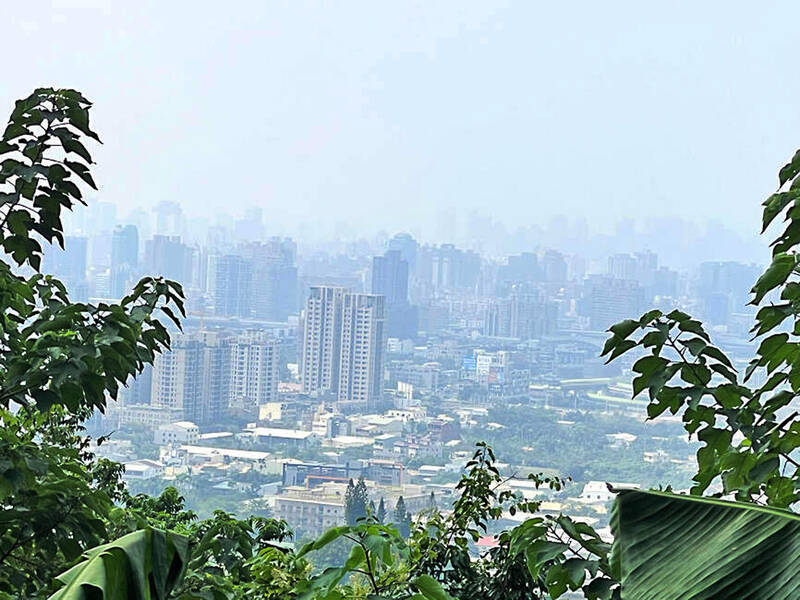The Ministry of Environment yesterday published a white paper on air quality policies aiming to bring down PM2.5 level to 8 micrograms per cubic meter while achieving the carbon reduction goal of 38 percent, plus or minus 2 percent, by 2035.
The white paper was formulated using a bottom-up approach by collecting 570 suggestions from the public and academics to guide the government to set up the 10-year goal and 42 action plans accordingly, Minister of Environment Peng Chi-ming (彭啟明) told a news conference yesterday.
While stationary pollution sources, such as factories, used to be stressed in air quality issues, mobile sources such as vehicle emissions have become more common and should be considered, he said.

Photo: Liao Yao-tung, Taipei Times
The white paper sought to integrate net-zero goals with air quality improvement efforts and set the goal of reducing PM2.5 levels to 8 micrograms per cubic meter in the next decade, aligning with the carbon reduction goal of 38 percent, plus or minus 2 percent, by 2035, Peng said.
The ministry has planned 62 schemes to meet such a challenging goal, including potential amendments to current air pollution laws, he said, adding that 18 artificial intelligence (AI)-powered tools would be introduced to aid the effort.
Department of Atmospheric Environment Director Huang Wei-ming (黃偉鳴) said PM2.5 levels had decreased by 47 percent from 2013 to last year.
However, a more diversified policy is required, as lowering PM2.5 levels has become more costly in money and personnel due to diminishing marginal returns and aggravated ozone pollution, he said.
Future air quality improvement efforts would be focused on bolstering people’s health, improving indoor air quality, addressing emerging air pollutants, promoting green transportation and sustainable agriculture, and developing talent and AI applications in this field, Huang said.
National Central University (NCU) environmental engineering professor Chang Moo-been (張木彬) stressed the importance of citizen participation in counteracting air pollution, saying that turning off unused lights and saving electricity can help reduce carbon emissions by fossil fuel power generation.
Carbon reduction and air pollution reduction efforts could be mutually exclusive, and would require further research and development to meet both targets, he said.
For example, factory operators would burn nitrogen oxides and volatile organic compounds to prevent them from forming ozone, but such combustion would generate carbon dioxide instead, Chang said.
NCU atmospheric sciences professor Lin Neng-huei (林能暉) said that nearly half of the responsibility to improve air quality would fall on the shoulders of citizens, as pollution from transportation sources made up 27 percent of air pollution and pollution from life sources 20 percent.
Chang Gung University green energy and environmental resources professor Lai Hsin-chih (賴信志) also raised awareness of transportation source pollution, calling on the public to join the effort by reducing car or motorcycle emissions around schools or traditional markets.
National Health Research Institutes researcher Chen Yu-cheng (陳裕政) said that PM1.0 — particles smaller than PM2.5 with a diameter of 1 micrometer or less — should be foregrounded to ensure human health, as such tiny particles could enter the blood and reach the brain.

The manufacture of the remaining 28 M1A2T Abrams tanks Taiwan purchased from the US has recently been completed, and they are expected to be delivered within the next one to two months, a source said yesterday. The Ministry of National Defense is arranging cargo ships to transport the tanks to Taiwan as soon as possible, said the source, who is familiar with the matter. The estimated arrival time ranges from late this month to early next month, the source said. The 28 Abrams tanks make up the third and final batch of a total of 108 tanks, valued at about NT$40.5 billion

Two Taiwanese prosecutors were questioned by Chinese security personnel at their hotel during a trip to China’s Henan Province this month, the Mainland Affairs Council (MAC) said yesterday. The officers had personal information on the prosecutors, including “when they were assigned to their posts, their work locations and job titles,” MAC Deputy Minister and spokesman Liang Wen-chieh (梁文傑) said. On top of asking about their agencies and positions, the officers also questioned the prosecutors about the Cross-Strait Joint Crime-Fighting and Judicial Mutual Assistance Agreement, a pact that serves as the framework for Taiwan-China cooperation on combating crime and providing judicial assistance, Liang

A group from the Taiwanese Designers in Australia association yesterday represented Taiwan at the Midsumma Pride March in Melbourne. The march, held in the St. Kilda suburb, is the city’s largest LGBTQIA+ parade and the flagship event of the annual Midsumma Festival. It attracted more than 45,000 spectators who supported the 400 groups and 10,000 marchers that participated this year, the association said. Taiwanese Designers said they organized a team to march for Taiwan this year, joining politicians, government agencies, professionals and community organizations in showing support for LGBTQIA+ people and diverse communities. As the first country in Asia to legalize same-sex

MOTIVES QUESTIONED The PLA considers Xi’s policies toward Taiwan to be driven by personal considerations rather than military assessment, the Epoch Times reports Chinese President Xi Jinping’s (習近平) latest purge of the Chinese People’s Liberation Army (PLA) leadership might have been prompted by the military’s opposition to plans of invading Taiwan, the Epoch Times said. The Chinese military opposes waging war against Taiwan by a large consensus, putting it at odds with Xi’s vision, the Falun Gong-affiliated daily said in a report on Thursday, citing anonymous sources with insight into the PLA’s inner workings. The opposition is not the opinion of a few generals, but a widely shared view among the PLA cadre, the Epoch Times cited them as saying. “Chinese forces know full well that